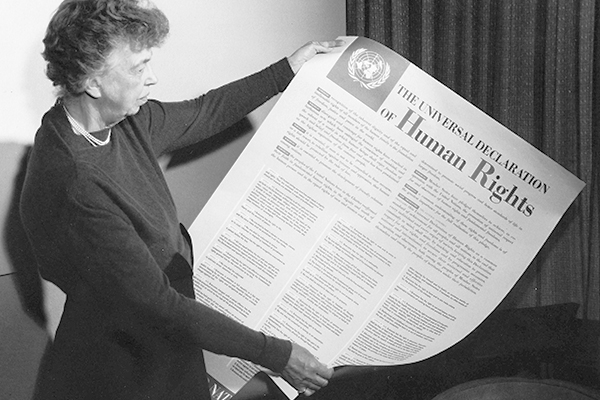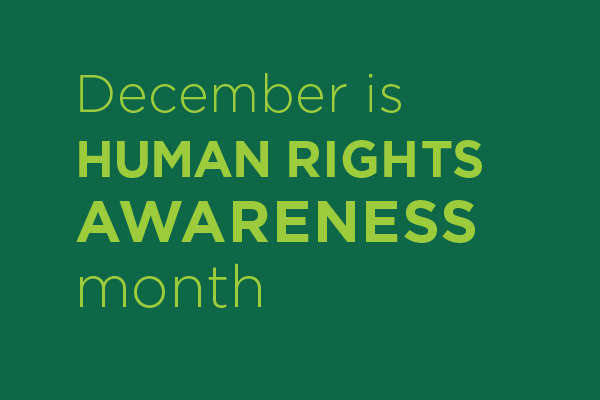“Whereas recognition of the inherent dignity and of the equal and inalienable rights of all members of the human family is the foundation of freedom, justice and peace in the world…”
These are the first words to the preamble for the Declaration of Human Rights as created by the United Nations. The document was inspired by Eleanor Roosevelt, who called the Declaration “the international Magna Carta for all mankind.” It was adopted by the United Nations on Dec. 10, 1948.
Central to what is taught and practiced at USF Health is the concept of human dignity and everyone’s “right to life, liberty and security of person, as Article 3 states in the Declaration.”
Faculty across USF Health incorporate content into their curricula that touches on human rights concepts and countless USF Health staff and students offer their time and expertise to community initiatives and agencies that target violators and help victims.
In honor of Human Rights Day, we’ve compiled a small sampling of how people at USF Health are working to improve the human condition for many, finding ways to open eyes for the many and varied needs that are so basic to being human.
College of Public Health: Service learning: Undergraduate public health students are guided to find their passion and dive in, both with volunteer efforts and with research in mind so they can help improve programs. Elizabeth A. Dunn, MPH, CPH, leads the class called Community Participation and Homeland Security, which has service learning as its foundation.
“The projects these students take on help put into context everything that has an impact on our personal home security, be it access to health care, education, shelter, safety,” Dunn said.
Students connect with resources throughout the region. Examples include: working with victims of human trafficking, teaching them life skills, from cooking to preparing for college; working with the Tampa Bay Refugee Task Force to organize a USF event for local refugees and helping them find local support programs, understand public transportation in this area, shop at our well-stocked grocery stores; working with the Red Cross and a disaster action team.
Morsani College of Medicine: Street Medicine: Students from the Morsani College of Medicine are passionate about bringing health care services to Tampa’s less fortunate street community. Two years ago, inspired by programs in other cities, a group of students began their street rounds downtown.
“We just filled our backpacks with medical supplies and started going out,” said Eric Monaco, a fourth-year medical student.
The Street Medicine Project is well received by the street community. “They do great work, I really appreciate it,” shared Mr. Roberts, a community member who has been seen multiple times by the student group for ailments related to high blood pressure and diabetes.
Aside from their street runs, the students also hold a monthly medical clinical at a grassroots community center called the Well. Student volunteers convert the second floor of the Well into a mini medical clinic with stocked with over-the-counter medication and first aid.
College of Nursing: Intimate Partner Violence: Anthonia Imudia, DNP, is training USF College of Nursing students how to recognize signs and symptoms that could indicate a patient is a victim of intimate partner violence or human trafficking. The content is part of a master’s level course called Child and Family and aims to help tomorrow nurses identify risk factors and signs of abuse.
“Many of these women have chronic health problems and key symptoms that are clues that they are victims of intimate partner violence or human trafficking,” Dr. Imudia said.
Among the lessons she teaches her students is that they, as front-line health care providers, have the opportunity to develop trust with their patients. Pregnancy, especially, is a window of opportunity for helping these victims because the women may be more motivated to find help as they look to become good parents and are thinking more about their futures. Knowing the signs of abuse could help these nurses guide these women to resources and agencies that will help, Dr. Imudia said.
Need help? Call 800-799-SAFE.
College of Pharmacy: Protection under the law: USF pharmacy students gain valuable information on how the U.S. Constitution will impact decisions they make in clinical and research settings.
Sarah Steinhardt, PharmD, JD, teaches pharmacy students Jurisprudence Pharmacy Law, spotlighting the five freedoms guaranteed under the First Amendment, in addition to government structure, civics, and the policy process as a background for how our laws are created and the standards our country is built upon.
“There are several areas where health care and law intersect, such as access to birth control and conscience clause issues and petitioning the government/advocating to Congress for action on health care issues, so these freedoms are critical knowledge for educated, responsible health care professionals and citizens of this country to understand and utilize when making informed clinical and ethical decisions,” Dr. Steinhardt said.
For the community, COP’s Thomas Towers, PharmD, coordinates a Drug Take Back Program with the Drug Enforcement Agency (DEA) to give patients a safe location to dispose of their unused prescription medications, which reduces dangerous, unwanted access to prescription drugs. The next event is scheduled for May.
USF Health Service Corps: Volunteering: The hub of community service and outreach for students across USF Health, the USF Health Service Corps connects students to hundreds of volunteer activities across the region. Last year, students provided more than 29,645 hours of community service that provided free services to 23,957 area residents.,
“It is a pleasure and a privilege to be able to volunteer with our enthusiastic and caring USF Health students in our USF Health Service Corps program,” said Corps Coordinator Ellen Kent, MPH. “The program is designed to provide all of our students with a wide variety of fun and meaningful service learning experiences for underserved members of our community.”
On Dec. 16 at noon, there is a special orientation session for students who wish to contribute to a new health education and mentoring program for refugees and students. Email ekent@health.usf.edu if interested and to get location information.
USF Health Deans: Voices for Human Rights: Watch these video shorts to hear Dr. Charles J. Lockwood, Dr. Donna Petersen, Dr. Dianne Morrison Beedy, Dr. Kevin Sneed and Dr. William Quillen talk about their own colleges.
Video/multimedia graphics by Sandra C. Roa, USF Health Office of Communications


